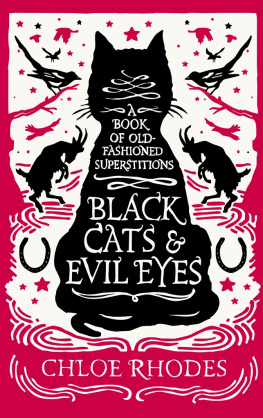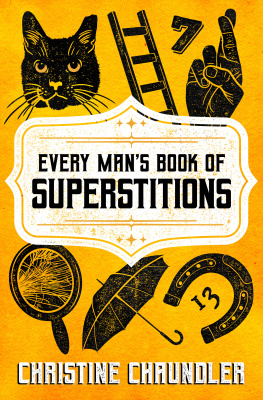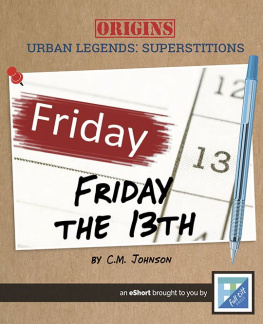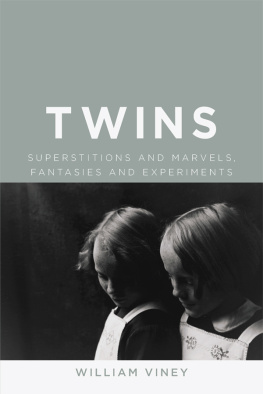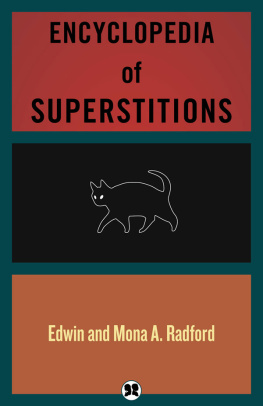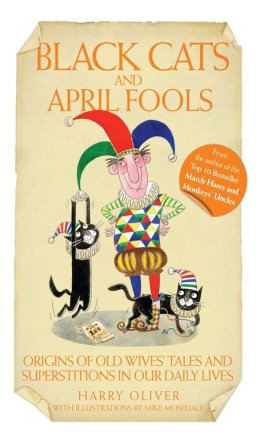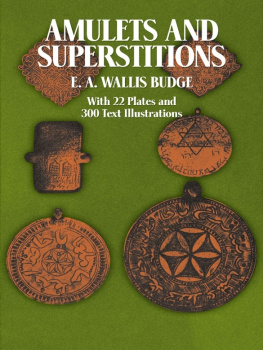A Certain Je Ne Sais Quoi: Words We Pinched From Other Languages
One For Sorrow: A Book of Old-Fashioned Lore

First published in Great Britain in 2012 by
Michael OMara Books Limited
9 Lion Yard
Tremadoc Road
London SW4 7NQ
Copyright Michael OMara Books Limited 2012
Illustrations copyright Aubrey Smith
All rights reserved. You may not copy, store, distribute, transmit, reproduce or otherwise make available this publication (or any part of it) in any form, or by any means (electronic, digital, optical, mechanical, photocopying, recording or otherwise), without the prior written permission of the publisher. Any person who does any unauthorized act in relation to this publication may be liable to criminal prosecution and civil claims for damages.
A CIP catalogue record for this book is available from the British Library.
ISBN: 978-1-84317-887-3 in hardback print format
ISBN: 978-1-84317-916-0 in EPub format
ISBN: 978-1-84317-915-3 in Mobipocket format
Designed and typeset by www.glensaville.com, from an original page design by Ana Bjeanevi
www.mombooks.com
For Mum and Dad
INTRODUCTION

One of the most powerful things about superstitions is the way they have become engrained in the public consciousness. Passed on by word of mouth from one generation to the next and cemented in our minds by repetition and corroboration, irrational beliefs can hold startling authority. So much so that even if we dont actually believe in them in our rational minds, we follow them because gut instinct tells us we should, or, as was more often the case in the past, because were too scared of the consequences if we dont.
Superstition is generally defined as an irrational belief that magic, luck or supernatural forces have the power to influence your life, or that actions that arent logically linked to an outcome may have an effect on it. Such beliefs tend to be held most ardently when people find themselves at the mercy of chance. The human survival instinct tells us to seek a solution if our lives are threatened and our bodies naturally equip us with the ability to fight or flee. For our ancestors living in an age without proper sanitation, a guaranteed supply of basic food and clean water or modern medicine, so many of the menaces they faced were utterly beyond their control. They couldnt fend off the waves on a sinking ship, outrun the plague or fight the frost that would ruin the harvest, so they searched for other ways to save themselves: sailors cutting off their hair as an offering to the gods so that the sea would spare them; medieval Londoners applying dead pigeons to buboes in the desperate hope of curing bubonic plague; a farmer leaving fertile land uncultivated to protect a swallows nest in case disturbing it caused his family to starve.
This book delves into the stories behind some of the superstitions that are still well known today, as well as exploring some of the most fascinating beliefs that have become less familiar in the modern age. Their origins are wide ranging, derived from either classical thought, religious ritual or rural wisdom. The focus is on those inspired by the hardships faced by everyday people in a time when life was nasty, brutish and short, so they mostly fall into the categories of death omens (now signs of bad luck), charms against evil or witchcraft, and rituals surrounding births, deaths and other dangerous times.
Like much folklore, superstitious beliefs were usually passed on by word of mouth, so written records can be hard to come by. In many cases several centuries passed between their first appearance in print and subsequent references, which presents a challenge to folklorists attempting to trace their evolution. However, there is enough on record to help the interested amateur gain some understanding of where many of our most mysterious beliefs stem from.
To understand the superstitions collected in this book in context, we must imagine ourselves in a world vastly different from our own. Those beliefs that date back to antiquity evolved in an era steeped in the mythology of a pantheon of gods with human flaws vying with each other for power, and where Fate might triumph over even the most formidable deity. Humans saw themselves as pawns in the games of the gods and powerless in the face of their own predetermined destinies. Ritual governed their lives not so much because they were superstitious, but because that was the custom of their day.
The many beliefs that took hold during the Middle Ages, and in the sixteenth and seventeenth centuries, did so against a backdrop of extremism unrecognizable even in this post 9/11 age. The often hysterical fear of witchcraft that swept through Europe (and later America) plays a central role in the histories of many of the superstitions examined here. One particularly resonant medieval manuscript offers an illuminating insight into the beliefs of those times. The Gospelles of Dystaues, or Distaff Gospels, written in 1470 and translated into English in 1507, documented for the first time the wisdom of French peasant women. The book illuminates, for example, our distrust of giving a knife as a gift, our belief that a pregnant woman should be given what she craves and our fear that a howling dog is an omen of death. The womens testimonies were documented before the persecution of wise women as witches began in earnest, so they detailed the charms and remedies they used with a freedom that is heart-breaking in light of the torture and murder of the witch hunts that followed.
The problem these old wives faced was that their beliefs fell outside the accepted religious framework of their time. For all its rituals and belief in the supernatural, the medieval Church would not tolerate this other kind of wisdom, and this was in keeping with religious authorities throughout history. Even the Ancients made a distinction between religious ritual and superstitious practice. The first-century Roman poet Ovid describes many of the mores of his day and uses the word superstition in much the same, faintly pejorative, way we do today to refer to those practices that were viewed as excessively credulous, whimsical or irrational.
This is one of the most fascinating things about looking back over the superstitions that have their origins in folklore. On the whole, they started out not as superstitions but as practices that were in keeping with the religious code or social norms of the time. They have come to be seen as superstitious only as our understanding of the world has deepened. If you carried a rabbits foot to ward off digestive trouble in Roman times, for example, you did so because it was what your physician recommended. If you carried one in the 1600s, like the diarist Samuel Pepys, you might have done so because although you knew it was mere fancy, it had worked for a respected friend and seemed also to have the desired effect on you. If you carry one today its probably attached to some sort of good luck key ring in the shape of a four-leaf clover with a horseshoe dangling from it, and you hold on to it either because your grandmother gave it to you on her deathbed or because you are extremely superstitious.
Following the same pattern of development, its easy to see how the religious observances of the ancient Romans became the superstitions of the early Middle Ages, and how the Devil-defeating practices of the medieval peasant became the derided old wives tales of the rationalist eighteenth century. What is really remarkable is that the seismic cultural shifts that have taken place over the centuries havent eradicated superstition entirely. In fact, if you take superstition to include beliefs in the supernatural beyond the religious norm of the time, we are much more superstitious now than we were two hundred years ago, when the combination of scientific achievement and authorized religion kept the vast majority of peoples beliefs within the mainstream. People have since begun to turn back to ancient healing methods like acupuncture, reiki and reflexology, and to the plant cures first used in Classical times. Twenty-first-century spiritualism and neo-paganism in all its forms are on the rise, and in the West, at least conventional religion plays the smallest role it ever has in human history.

